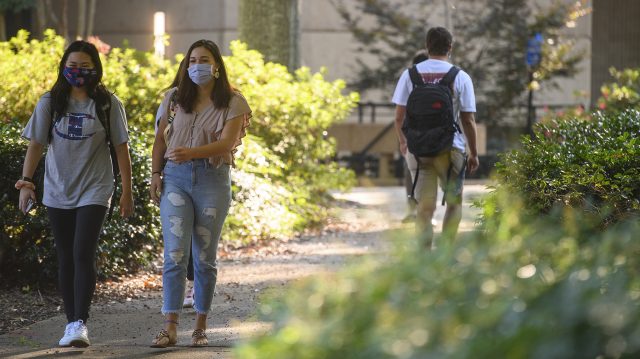
The results of UM’s Assessment of Climate for Learning, Leaving and Working, a campuswide survey conducted in 2019, indicate that the university is comfortable for a majority of students. But the report also points to opportunities for improvement. Photo by Thomas Graning/Ole Miss Digital Imaging Services
OXFORD, Miss. – Results of the University of Mississippi‘s Assessment of Climate for Learning, Living and Working, a campuswide survey conducted in fall 2019 among students, faculty and staff, were shared Tuesday (Sept. 22). The results are intended to assist the university’s efforts to create an open, fair and equitable environment.
The survey asked students, faculty and staff about their campus experiences as they pertain to perceptions of inclusion and support. Climate, as defined by the survey and resulting data, is the attitudes and behaviors of faculty, staff, administrators and students, as well as institutional policies and procedures, which influence the level of respect for individual needs, abilities and potential.
The survey, conducted in partnership with Rankin & Associates, found that 71 percent of respondents were “comfortable” or “very comfortable” with the overall climate.
“On the one hand, this is reassuring,” said Shawnboda Mead, interim vice chancellor for diversity and community engagement. “On the other hand, we should take no solace in learning that one out of every four or five individuals are less comfortable with the overall climate.
“We are eager to better understand this gap with greater acuity, some of which can be gleaned from the reports, some we cannot. Nevertheless, we have an obligation to close this gap.”
With insight into areas of success related to inclusion and support, as well as opportunities for improvement, the university is better positioned to develop programs and policies to meet the needs of the campus community.
Sue Rankin, CEO of Rankin & Associates, shared the results of the survey during a virtual presentation to students, faculty and staff. Among a variety of findings shared, Rankin highlighted several areas of success that the university community detailed in the survey, including:
- 83% of students and faculty respondents were comfortable with their classroom environment
- 70% of staff respondents felt that their direct supervisors provided adequate support for them to manage work-life balance
- 78% of student respondents felt valued by faculty in the classroom
Rankin also shared some challenges and opportunities for improvement, including:
- 17% of respondents personally experienced, and 30 percent observed, exclusionary conduct in the year before responding
- 15% experienced unwanted sexual contact or conduct
- 60% of faculty and 55% of student respondents seriously considered leaving the university in the previous year
Rankin stated during the presentation that the findings of the survey at UM were consistent with other surveys conducted at more than 200 universities across the country. Rankin pointed out that each of the challenges and opportunities areas are consistent with findings at peer institutions, and that at UM, instances of unwanted sexual contact reported in the survey are considerably lower than on similar campuses. But even as the numbers line up with peer institutions, Rankin said they are still important indicators of work to be done.
During the presentation, Mead acknowledged that the COVID-19 pandemic has influenced the findings of the survey.
“Even with the majority of interactions taking place as virtual engagements, we still experience a campus climate,” Mead said. “Especially during these challenging times, a more positive campus climate improves learning, well-being, productivity, and success of students, faculty and staff.”
Community Commitment to Long-term Change
The publication of the results marks the beginning of a long-term commitment from the university to improve the campus climate. Next week, the Division of Diversity and Community Engagement and the Climate Study Working Group are hosting six action forums to gather feedback on the survey results before setting concrete first-year action items and finalizing the institution’s long-term strategic diversity, equity and inclusion plan.
“We can make our suggestions about how we might move forward,” Rankin said. “But this shouldn’t just come from an outsider like us; it needs to come from the community. The change doesn’t come from senior leaders; the change comes from the community.”
Chancellor Glenn Boyce reiterated the importance of commitment by the entire community to create action items that will make a difference in the university and the lives of everyone involved.
“As members of the university community, your engagement with this effort is imperative,” he said. “Our commitment to this study and acting on its findings is crucial to how we grow as a university. It is essential to a thriving institution where faculty, staff and students are fulfilled and successful.”
Give Your Feedback
Members of the Ole Miss community are encouraged to submit feedback on the survey results and recommendations for how the university can move forward.
“The students, faculty and staff of the University of Mississippi care deeply about the university, its mission and the people it serves,” said Cade Smith, assistant vice chancellor for community engagement. “They also believe in an even better university and are willing to do the hard, collaborative work to move us toward that potential.”
Forums will be held according to community group:
- Undergraduate students – 5-6 p.m. Tuesday (Sept. 29)
- Graduate students – 5-6 p.m. Tuesday
- Law students – 5-6 p.m. Wednesday (Sept. 30)
- Faculty – 4-5 p.m. Wednesday
- Staff – 4-5 p.m. Tuesday and 9-10 a.m. Wednesday
Students, faculty and staff are encouraged to register to attend a forum by Monday (Sept. 28) or submit an Action Feedback Form by Oct. 2.
The results of the campus climate survey can be found here.